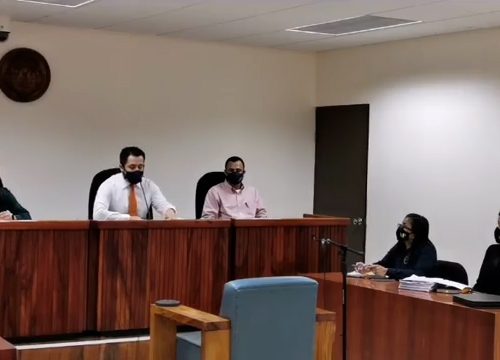
The femicide of Mariana Leiva will be retried next Monday, October 26, this time in the Criminal Court of Liberia.
Leiva was from Liberia and graduated with a degree in industrial engineering from the Technological Institute of Costa Rica (ITCR). The 37-year-old was passionate about riding horses and loved animals. She was the eighth victim of femicide in the country in 2018, the first one to take place in Guanacaste that year.
In July 2018, her husband and murderer, Ronaldi Sequeira Duarte, was sentenced to 37 years in prison by the Flagrancy Court, which handles cases when someone is arrested at the time they commit the crime or immediately afterwards.
However, Sequeira’s defense lawyers, Adan Carmona and Felipe Gallegos, appealed the verdict. The Court of Appeals accepted the case and annulled the sentence in September 2019. Since then, Sequeira has remained in preventive detention.
According to the appellate judges, Jose Manuel Cisneros, Gerardo Ruben Alfaro and Cynthia Dumani, “there were substantive violations of due process” during the debate proceedings. They also indicated that the debate was held without the defense “having the opportunity to access the entirety of the evidence in a timely manner and adequately prepare its strategy.”
The “strategy” of the defense is for Sequeira to be tried for the crime of “attenuated homicide” and not femicide, as they demonstrated during the previous debate and even in the appeal.
An attenuated homicide is when the offender acts driven by his emotions and without full control of his actions. On the other hand, femicide is when a man kills his wife or partner. As explained on the Observatory of Gender Violence against Women and Access to Justice’s website, in femicide, the woman is murdered “because of her condition as a woman” and is “normally the product of escalating violence and an unequal relationship between the woman and the femicidal man.”
Changing the type of crime would mean a radical change in justice for Mariana Leiva: while femicide carries a sentence of up to 35 years in prison, attenuated homicide is punishable by a maximum of six years.
The Mistakes
On March 7, 2018, two days after the femicide, the Public Ministry prosecutor Ricardo Quiros asked the Flagrancy Court to hear the case.
[The decision] was made based on the evidence at the time of the accused’s arrest,” explained the Prosecutor’s Office press department.
And they added that “the spontaneous manifestations of [Ronaldi Sequeira Duarte], who surrendered and affirmed that he was the one responsible for having killed the victim,” led the prosecutor to believe that he had “sufficient evidence to develop the case through flagrancy.”
Ewald Acuña, a lawyer specialized in criminal sciences, said “it is very rare and inconvenient for a murder or femicide trial to be done through the flagrancy route because it requires technical evidence that isn’t easy to obtain within the flagrancy timeframe.”
Quiros even anticipated that Sequeira’s defense team would request evidence that involved extensive psychological and forensic analysis, but said that the Public Ministry was committed to bringing forth the evidence.
“It’s true that psychology reports take a long time; it’s true that psychiatry reports take a long time, but what is also true is that all of this can be done in a short term of 15 days,” Quiros countered.
The defense isn’t going to ask for impossible things. It is going to ask us for medical reports, psychiatric reports, and the Public Ministry is going to be in charge of delivering them,” he reiterated.
The lawyer in charge of defending Sequeira at that time opposed the prosecutor’s request because they needed “to establish a theory for the case urgently with sufficient evidence,” and said that, from experience, the evidence they would request would take one to three months to gather.
The Flagrancy Court declared itself competent for the case, taking into account that the prosecutor assured that they would have the evidence in 15 days. However, 13 days later, on March 22, the evidence that the defense requested was not ready.
The portrait of a group of friends lacks a loud laugh and a family is missing a member. This was Mariana Leiva, victim of a femicide.
According to the Court of Appeals, this led to several errors during the four months of the proceedings, for example, not complying with the time periods established by law. In addition, some of the reports were also submitted late and eight days had to pass for the prosecution and Sequeira’s defense to study them, which lengthened proceedings that need to be “expeditious.”
On the other hand, according to the court, the defense didn’t know about evidence that had been admitted and the process even had “breaches in impartiality.” In other words, it ended up benefiting the prosecution, for example, when the court insisted that it be done by the flagrancy route” even though the evidence that the defense was waiting for had not arrived at that moment.”
What Does the New Trial Mean?
Mariana Leiva’s femicide will be decided by judges in the Criminal Court of Liberia. In addition, the case is now in the hands of prosecutors Elvis Lopez and Ligia Lacayo since the person in charge in the previous trial, Ricardo Quiros, retired.
According to criminal lawyer Ewald Acuña, a new trial has the same witnesses and the same evidence that had already been admitted, but it could also provide “new evidence that they didn’t have news about or a way to provide prior to the first trial.”
The trial will take place two years and seven months after the femicide. Acuña indicated that holding a trial some time after the fact will be detrimental to the testimonial evidence.
Scientifically it is proven that as time goes by, people’s memory deteriorates,” Acuña remarked.
However, in this type of trial, it must be understood that testimonial evidence is one of many other pieces of evidence that does not undergo change, so there’s no risk of impunity or of the system failing,” he added.
Feminist lawyer and human rights activist Larissa Arroyo believes that restarting a process like this indicates that there is a structural error in the legal system.
“Those who handle cases at the first level [including prosecutors, lawyers and lower courts] do not have such deep knowledge as the appellate courts,” the specialist said, adding that due to these errors, “the victims are subjected to endless and highly painful processes.”
“It is very complicated because even I as a human rights defender couldn’t simply say, ‘you can’t start over.’ Beyond that, the penal system establishes that accused people should have rights,” said Arroyo.
Sequeira was sentenced to 37 years in prison for femicide and arson
An Undeniable Crime
On the night of March 5, 2018, Sequeira stabbed his wife 11 times, slit her throat, and then set fire to the room they shared in their house located in the Capulin neighborhood in Liberia. After committing the crime, he turned himself in to the police station of Liberia.
The Public Force detained him and firefighters found Mariana Leiva with her throat slit and her body partially burned.
During four months of proceedings, Ronaldi’s defense attorneys and he himself said that Leiva induced him to drink, that she treated him like a househusband, that she was unfaithful to him and that, as a professional, she could not be a victim of violence, all arguments designed to place the blame on the dead victim and not on the murderer.
The judges in charge of the Flagrancy Court trial, Veronica Elizondo, Andrea Rodriguez and Breiner Escamilla, sentenced Sequeira to 37 years in prison, 30 for the femicide and seven for the fire that put the neighborhood at risk.
The new hearing to provide justice for Mariana Leiva will be public and will be held in the Criminal Court of Liberia next Monday, October 26. “Access to trials is being regulated as a result of the health measures due to the COVID-19 pandemic,” indicated the Public Ministry press department.







Comments